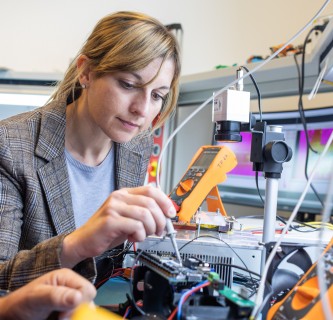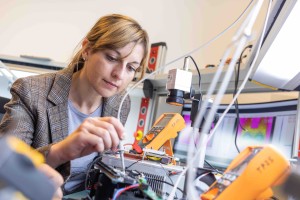Power Electronic Engineering
My Studies

“The Power Electronics Engineering degree programme opens doors to a fascinating career, in which our graduates can help reshape the world of electronics and make a significant contribution to solving global energy challenges.”
Key subject areas
More performance. Power converter.
Power converters are critical to the efficient transmission and use of energy, efficiently converting the voltage, current, and frequency of electrical signals. You will learn how to design and control power converters, to manufacture prototypes, and to bring them to series production.
Adrenalin. E-mobility.
E-mobility is fundamentally changing the required technologies. You will learn to combine efficient e-motors, powerful batteries and effective inverters with modern control algorithms to create the next generation of drives, and can directly apply your knowledge on the racetrack with our successful FH JOANNEUM Racing Team.
Renewable. Energy.
Renewable and regenerative energies are key concepts in modern energy generation as they are based on sustainable sources such as the sun, wind, water, and biomass. You will learn how to make the best use of renewables, from their generation and distribution to storage.
Practice. Prototyping.
Prototyping in power electronics is critical for testing the function and performance of power electronic components and identifying potential design improvements. You will produce experimental models in our laboratories and gain a realistic insight into how power electronics solutions work in practice.
Master’s Thesis & Scientific Work
In your Master’s thesis you will carry out research in your specialised field and present the results in a scientific manner.
“I have chosen the Master’s degree programme in Electronics Engineering because I am fascinated by digital technologies. I enjoy solving challenging problems in the fields of electronics and informatics and finding solutions for the future. This course opens up a wide range of excellent career opportunities.“
Organisation
Our degree programme takes an overwhelmingly practice-oriented approach. Students work in small groups in excellently equipped laboratories, ensuring they receive individual supervision and plenty of hands-on experience. Moreover, study and in-person attendance is scheduled between Wednesday and Friday, giving students the opportunity to gain additional experience by working part-time for a company in the industry.





